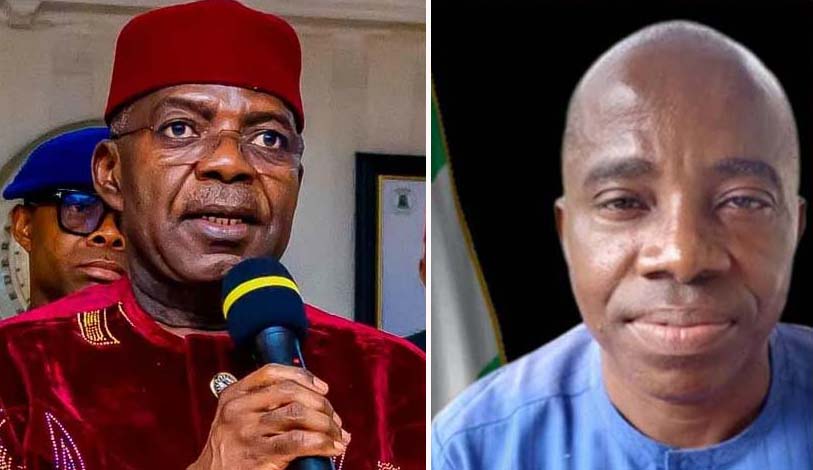“Previous administration was simply borrowing without a clear plan on what should be the impact of the debt on development or how to pay back on a sustainable basis – All that is going to change under the Dr. Alex Oti led administration, as we unveil a number of reforms in Public expenditure management”
In an interview granted by the Director General, Abia State Department of Debt Management Office, (DMO) Dr. Benson Nwaigubru, he clarifies the position of the DMO on Abia debt situation and confronting challenges that may impede accelerated development of the Alex Otti programmes on infrastructure development, financing and introducing reforms that will reposition the DMO into an agency.
Question: News Report of Abia debt profile continues to project separate figures between loan balance of over N77 billion and another of over N191 billion respectively. Does both figures portray separate financial deficits, please clarify
DG: Abia DMO: If your question is whether the debts portray different financial deficits, my answer to you will be Yes. Now let me clarify the two figures for better understanding of Abians. The N77 billion loan balance are the unpaid debts that were procured from 3 new generation banks and the Budget support facility that was given to States by the Central Bank of Nigeria. If you recall, the Central bank called for the repayment of that loan by states. Now, the N191 billion is when you add domestic debt comprising of unpaid salary arrears, pension arrears, gratuity arrears, contractors’ arrears and external debt loan stock in the neighborhood of about N42 billion. Abia debt is not only owed to Banks or Central Bank, the amount owed to workers and contractors are also part of the total public debt stock of the state. Thank you.
Questions: It is obvious borrowing by State government will not end with the Okezie Ikpeazu PDP Administration, as agency of government responsible for the coordination of public debt by the state, what is your take on the state taking more loans despite the inherited debt challenge
DG: Abia DMO: Let me say this, the problem with Abia Debt under Okezie Ikpeazu Administration was that it had no strategy to it. Government was simply borrowing without a clear plan on what should be the impact of the debt on development or how to pay back on a sustainable basis. That was why the debt bunched together and become unsustainable.
All that is going to change under the Dr. Alex Oti led administration, in a few weeks time a number of reforms in Public expenditure management will kick off. The first is that the government will upgrade the debt management office to an Agency with trained professionals to manage debt. Currently, that function is scattered in other ministries and agencies.
Another major reform is that the Government will develop a debt Management Policy Framework which will guide policy makers on how to manage Abia public debt.
The other aspect of the reform we are planning is that there will be medium-term debt management strategy ( 2024-2027) to ensure the achievement of debt policy objectives. Once we are done with these reforms and the reforms of internally generated revenue begins to bear fruit, Abia debt will be managed professionally and in a way that it will not constrain the state from borrowing more to finance development. Note that Debt is not altogether a bad thing, what is bad is that you have no strategy to it or what it was invested in was not properly thought through.
Question: The government of Alex Oti declared emergency in certain critical areas, from IGR, Security, education, health, Road infrastructure etc. Regarding the debt situation of the state and the government stance to operate on a lean budget, Do you have any specific role to enforce compliance despite the financial burden of delivering these emergencies.
DG: Abia DMO: Governance is all about priority setting, careful planning and execution. It is often said that he who fails to plan, planned to fail. No matter the challenges that the state faces, the power of planning and transparency in execution that Dr. Alex Oti promised to anchor his governance will reduce the burden you see now to a great length.
On debt, I have said we are not going to handle the issue of debt blindly; We will have a strategy to it including rescheduling some of them so that we create elbow room to borrow more and not default on our debt servicing obligations. As a government, Dr. Otis administration will plug all loopholes that enable fiscal leakages in order to conserve funds for critical development projects. There will be zero tolerance for unbridled corruption that fritters away state resources into private pockets. When we enforce that and with our debt management policy and strategy in place, the state will navigate through its current revenue challenges until economic growth picks up which will yield more revenues through domestic resource mobilization and return Abia state on the path of fiscal stability and sustainability.
Question: In your assessment what were the failures of previous PDP led administration in managing the debt situation of the State that you feel you can do better with the present administration despite that the challenges do not appear to abate
DG: Abia DMO: I said it before that there was a whole lot that was wrong in the approach of the past PDP administration in managing public debt. First, there was no clear policy guiding debt procurement. That was why our debt stock was rising and yet we had no infrastructure to show for it.
Second, there was no strategy to public debt management and that was why our debt stock was rising and civil servants were not paid, gratuities were not paid, contractors were not paid for. That is a failure of strategy. Dr. Alex Oti’s approach will be built on trust. We can approach our creditors and show them our strategy to manage our public debt sustainably that will enable us to service our debts and create room to borrow more in a way it will not constrain us from delivering critical infrastructure. When they see our commitment to our strategy and policy, they will trust the government to keep its commitments. That will open other avenues to borrow more to deliver on our promises.
Question: In tackling the challenges facing this administration, how do you intend to improve the office of the Abia State debt management so that your presence will reflect on the prosperity for all mantra of your government?
DG: Abia DMO: Debt Management is a critical element of governance all over the world. Countries must borrow to fund their projects and programmes. Do you know that America is the world’s greatest debtor country. But the difference is that there is always a clear policy guide to how you manage your debt. For me, the first thing is to start the process of upgrading the debt management office to a debt Management Agency. We will look inwards and select competent staff that will be trained by professionals to understand the rudiments of public debt management. We will put in place a clear debt management strategy and policy that will guide borrowing, expenditure and repayment. Keep in mind that if we invest in infrastructure and recover Aba as a manufacturing and trading hub in West Africa, we would have repositioned the state to industrialize and through domestic resource mobilization increase government revenue with which we can then begin to manage our debts more sustainably.
Question: How do you plan to address the issue of debt financing so that your government is not restricted by the burden of debt that are certain to increase for any serious development to take place
DG: Abia DMO: We are going to deploy a number of strategies to ensure that we sustainably service our debts in a manner it will not become a burden to financing other development projects.
First, we have to reconcile the existing debts and know their tenure structure, interest rate structure and maturity structure. We will then engage our creditors for the ones that is maturing early and ask for rescheduling or restructuring of the debts. We can then spread them for a little longer and reduce the burden of debt serving and interest payments on our revenue profile. When we conclude that, you can then see that we aim at effective budgeting and budget implementation to ensure that our policy goals as a government is on course. Then we take it from there. We are going to be very deliberate about our debt management henceforth and Abians will feel the impact as we progress.
Thank you






